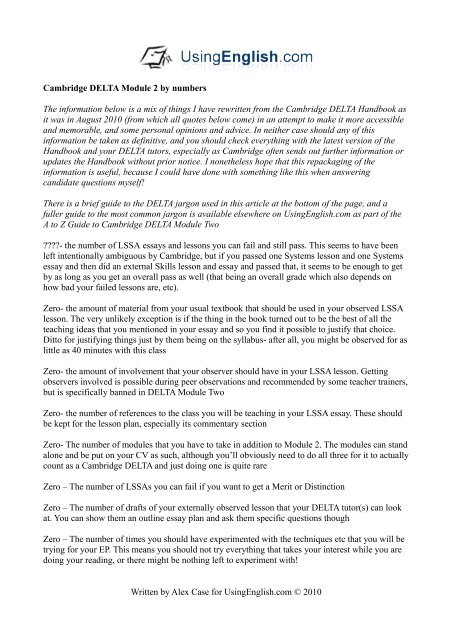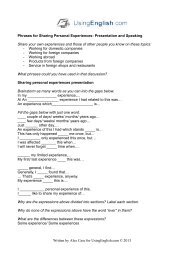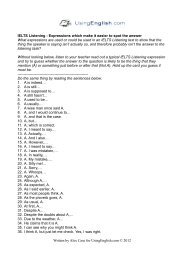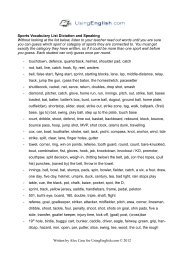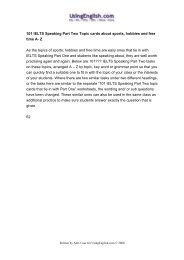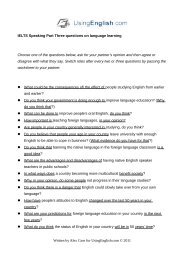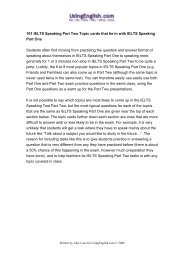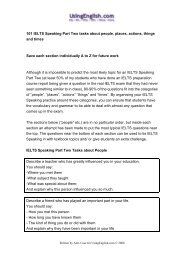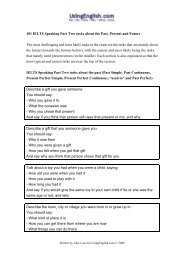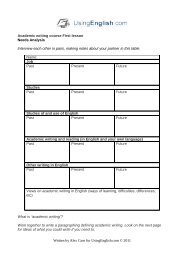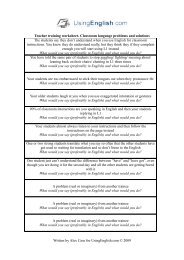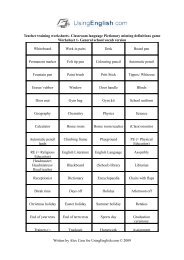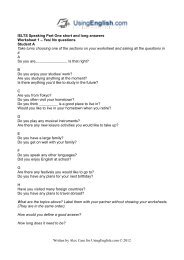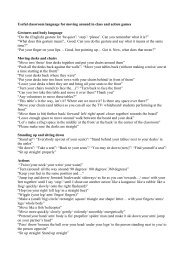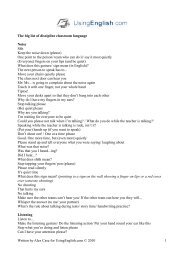You also want an ePaper? Increase the reach of your titles
YUMPU automatically turns print PDFs into web optimized ePapers that Google loves.
<strong>Cambridge</strong> <strong>DELTA</strong> <strong>Module</strong> 2 <strong>by</strong> <strong>numbers</strong><br />
The information below is a mix of things I have rewritten from the <strong>Cambridge</strong> <strong>DELTA</strong> Handbook as<br />
it was in August 2010 (from which all quotes below come) in an attempt to make it more accessible<br />
and memorable, and some personal opinions and advice. In neither case should any of this<br />
information be taken as definitive, and you should check everything with the latest version of the<br />
Handbook and your <strong>DELTA</strong> tutors, especially as <strong>Cambridge</strong> often sends out further information or<br />
updates the Handbook without prior notice. I nonetheless hope that this repackaging of the<br />
information is useful, because I could have done with something like this when answering<br />
candidate questions myself!<br />
There is a brief guide to the <strong>DELTA</strong> jargon used in this article at the bottom of the page, and a<br />
fuller guide to the most common jargon is available elsewhere on UsingEnglish.com as part of the<br />
A to Z Guide to <strong>Cambridge</strong> <strong>DELTA</strong> <strong>Module</strong> Two<br />
????- the number of LSSA essays and lessons you can fail and still pass. This seems to have been<br />
left intentionally ambiguous <strong>by</strong> <strong>Cambridge</strong>, but if you passed one Systems lesson and one Systems<br />
essay and then did an external Skills lesson and essay and passed that, it seems to be enough to get<br />
<strong>by</strong> as long as you get an overall pass as well (that being an overall grade which also depends on<br />
how bad your failed lessons are, etc).<br />
Zero- the amount of material from your usual textbook that should be used in your observed LSSA<br />
lesson. The very unlikely exception is if the thing in the book turned out to be the best of all the<br />
teaching ideas that you mentioned in your essay and so you find it possible to justify that choice.<br />
Ditto for justifying things just <strong>by</strong> them being on the syllabus- after all, you might be observed for as<br />
little as 40 minutes with this class<br />
Zero- the amount of involvement that your observer should have in your LSSA lesson. Getting<br />
observers involved is possible during peer observations and recommended <strong>by</strong> some teacher trainers,<br />
but is specifically banned in <strong>DELTA</strong> <strong>Module</strong> Two<br />
Zero- the number of references to the class you will be teaching in your LSSA essay. These should<br />
be kept for the lesson plan, especially its commentary section<br />
Zero- The number of modules that you have to take in addition to <strong>Module</strong> 2. The modules can stand<br />
alone and be put on your CV as such, although you’ll obviously need to do all three for it to actually<br />
count as a <strong>Cambridge</strong> <strong>DELTA</strong> and just doing one is quite rare<br />
Zero – The number of LSSAs you can fail if you want to get a Merit or Distinction<br />
Zero – The number of drafts of your externally observed lesson that your <strong>DELTA</strong> tutor(s) can look<br />
at. You can show them an outline essay plan and ask them specific questions though<br />
Zero – The number of times you should have experimented with the techniques etc that you will be<br />
trying for your EP. This means you should not try everything that takes your interest while you are<br />
doing your reading, or there might be nothing left to experiment with!<br />
Written <strong>by</strong> Alex Case for UsingEnglish.com © 2010
Zero- the number of acceptable footnotes<br />
Zero- the number of references that you can put in an appendix to save space in the body of the text<br />
Zero- the number of teaching suggestions that you can put in your LSSA essay even though they are<br />
not specific to the language or level that is in your essay title<br />
Zero- the amount of help your <strong>DELTA</strong> tutors can give you when you write up the reflection on your<br />
externally assessed lesson<br />
Zero- the number of words in an LSSA essay conclusion. Just finish with an evaluation of the<br />
teaching ideas (or of the last teaching idea if you have been evaluating them as you go along)<br />
Zero or one – the number of peer observers in your EP lesson, of which the best is probably one as<br />
that gives you more to write about and a different perspective<br />
Zero or one- The number of beliefs questionnaires you must complete before writing Part Two of<br />
your RA. Some course providers insist on this, and it certainly makes identifying and reflecting on<br />
your beliefs easier, but it doesn’t actually seem to be a requirement of <strong>Cambridge</strong><br />
One – the number of words over the word limit for the essays that could affect your mark, e.g.<br />
making it impossible to get a Merit or Distinction. Meeting the word limit is the easiest mark in<br />
<strong>Module</strong> 2, so there really is no excuse for writing 2501 words rather than 2500<br />
One – the number of LSSAs that you can do on each Skill or area of Systems i.e. no two lessons on<br />
grammar<br />
One – The number of each kind of LSSA you will need to pass, i.e. at least one Skills and one<br />
Systems<br />
One – The number of drafts of your LSSA essays that your tutor will usually read through and look<br />
at, although they can give you more support for LSSA and it’s best to practice doing it with even<br />
less support before your externally observed lesson if you can<br />
One- the number of unassessed diagnostic lessons that your tutor will sit in on. You can of course<br />
ask other people to sit in on your other lessons before or after that if you wish<br />
One- the number of lessons observed <strong>by</strong> an external observer which you have to pass (out of one)<br />
One – the number of LSSAs on productive skills (writing or speaking) and on receptive skills<br />
(reading or listening). In other words, you can’t do two productive skills lessons or two receptive<br />
skills lessons<br />
One – Definitely too few things to pick out as things to work on (i.e. weaknesses you identify) as<br />
part of your PDA or after an LSSA, but a possible number for the priorities that you choose (that<br />
being what priorities mean after all)<br />
Written <strong>by</strong> Alex Case for UsingEnglish.com © 2010
One – The number of lessons which must be a Merit to get a Merit overall. It doesn’t matter how<br />
many essays are Merits if you don’t get a Merit in at least one lesson. The external must be a Merit<br />
to get a Merit, so that is the one!<br />
One or more- The number of categories which are not (fully) met in a way that “demonstrate that<br />
the candidate lacks depth and/or breadth of background knowledge and/or convincing application to<br />
classroom practice” for the essay or “have a negative impact on the candidate’s classroom practice<br />
and the learning that takes place” for the lesson (page 60) that can lead to a fail<br />
Two- The number of grades for each LSSA, being one for the lesson and one for the essay. You will<br />
also be given an overall grade, but the lesson grades are also important as they have more influence<br />
on your overall grade than the written work<br />
Two- The number of grades that are available for the PDA, being just Pass or Fail. This is unlike the<br />
LSSAs, which also have Pass with Merit and Pass with Distinction available. You can pass <strong>Module</strong><br />
Two without passing the PDA, but you must get a Pass to get a Merit or Distinction.<br />
Two – the number of LSSAs that you do before writing Part Three of your RA (Reflection and<br />
Action, half of your PDA)<br />
At least two- The number of tutors who will check your work, for example a local <strong>DELTA</strong> tutor and<br />
online tutor if you are doing a distance course<br />
Three- The possible marks you can be given for each category and sub-category of assessment<br />
criteria for your lesson and essay, being Met, Partially Met, Not Met<br />
Three- the section headings recommended <strong>by</strong> <strong>Cambridge</strong> for LSSA post-lesson written reflections:<br />
“Planning and outcomes, Strengths and weaknesses and Consolidation and follow up” (page 65)<br />
At least three - the number of different sources you have to quote in the essays for the LSSAs.<br />
Although it is not stated, this is also a good minimum number of references in the essay for the RA<br />
part of the PDA. For the LSSAs, three meets the criteria but at least 8 to 10 is probably better<br />
At least three or four days – The length of time you should probably give your tutor to get back to<br />
you on each thing you need feedback on, usually meaning the essay title, outline of essay or first<br />
draft, further feedback on essay, lesson plan, and reflection. That adds up to at least two weeks<br />
before your observed lesson that you should let your tutor know what essay title you are thinking<br />
about<br />
Four – Almost certainly too many things to pick as priorities as things to work on in your LSSA and<br />
PDA reflections. This is a good number of weaknesses to mention, but you’ll need to narrow the<br />
number of priorities down with reference to their effect on student learning before you decide on an<br />
action plan<br />
Four- Number of LSSAs<br />
Four- The number of LSSAs you will to pass (i.e. all of them) if you want to be in with the chance<br />
Written <strong>by</strong> Alex Case for UsingEnglish.com © 2010
of a Merit or Distinction<br />
Four- The number of things that count as language systems that you should choose two from-<br />
grammar, lexis, phonology and discourse. You cannot do both Systems LSSAs on the same system,<br />
i.e. two lexis lessons is not allowed<br />
Four- The number of grades that are available for the LSSAs and the <strong>Module</strong> Two overall grade,<br />
being Fail, Pass, Pass with Merit and Pass with Distinction. A grade is given separately for the essay<br />
and lesson (including lesson plan and post lesson reflection) and an overall mark is then given.<br />
Four – the number of parts of the RA part of the PDA, three parts of which is written and submitted<br />
separately to be commented on <strong>by</strong> your <strong>DELTA</strong> tutors, but which can be polished up for the final<br />
version to be submitted. Part One is the diagnostic lesson, for which you submit a lesson plan as an<br />
appendix and reflect on for Part Two of the RA<br />
Four- the number of Merit and Distinctions you need for individual lessons to get a Distinction<br />
overall, i.e. a Merit or Distinction for all the LSSAs<br />
Four- the number of assessment categories for the LSSA essays. All categories must be fully met for<br />
a Distinction.<br />
Four- the things that need to be covered in the LSSA essays, and so also the suggested organisation:<br />
(short) introduction, analysis (of the topic area), issues (mainly potential problems) for learners, and<br />
suggestions for teaching (with evaluation of those ideas)<br />
Five- Almost certainly too few words for an LSSA essay title<br />
Five- The total number of assignments to be completed to pass <strong>Module</strong> 2 (four LSSAs and the<br />
PDA), although you could see it as six as the PDA has two separate parts<br />
Five- Minimum number of students in observed lesson. There is no maximum. There must be that<br />
number of students for the observer to start observing, and you can delay the observation for up to<br />
15 minutes if you are waiting for a late student to make up that number or are desperately searching<br />
for a replacement from another class<br />
Five- the number of things which must be on the LSSA essay cover pages- “the title of the essay,<br />
number of words used, date of submission, candidate name and centre number” (page 62)<br />
Six- the number of things you need to remember to include in the LSSA essay: cover page, contents<br />
page, running footer with your name and essay title, page <strong>numbers</strong>, bibliography, and appendices<br />
(the last being optional but usual)<br />
Six- the number of assessment categories for the LSSA lessons. All categories must be fully met for<br />
a Distinction.<br />
Ten - the number of hours of peer observations that you must do. Most people do this as 10 onehour<br />
observations, but other combinations are possible. You can also observe people’s lessons<br />
Written <strong>by</strong> Alex Case for UsingEnglish.com © 2010
through videos instead<br />
Ten – almost certainly too much observation to do before writing RA Part Three, as although it feels<br />
good to get the peer observations out of the way, you have to write about how you are going to<br />
continue and improve your development and more focussed peer observations is an obvious way of<br />
doing this. If you aren’t going to do more peer observations, you’ll have to think of or find out<br />
about some other ways of working on your weaknesses at that point<br />
Fourteen- the average number of words of the LSSA essay titles given as good examples in the<br />
Handbook (page 63)<br />
Fifteen minutes – The maximum extra time that an observer will stay to see the rest of your lesson<br />
if you haven’t managed to complete what is written on your lesson plan in the amount of time you<br />
asked them to come for<br />
Fifteen minutes – The maximum you can delay the start of the observed lesson if you don’t have the<br />
required five students when the observer was meant to enter the classroom<br />
Forty to sixty minutes (previously 45 to 60) - the length of all the lessons that you teach as part of<br />
the course. It is the length of time the observer will sit in your lesson (you can choose exactly how<br />
long you want them to stay and when they should enter and leave the class). You obviously teach<br />
the rest of your lesson as you usually would if it is a different length, and whether that will be<br />
related to the observed part or not is up to you. You can briefly mention the other parts of the lesson<br />
on your lesson plan, but anything that you want to be judged on should be in the observed period.<br />
40 to 60 minutes is also the length of the EP lesson plan and the diagnostic lesson observation<br />
Sixty minutes - the time before your observed lesson when your essay and lesson plan must be<br />
ready and given to your observer (and/or uploaded for a distance course), but obviously much<br />
earlier is much better!<br />
150 – the recommended number of words to write about current weaknesses in RA Part Three<br />
No more than 200- the strongly recommended maximum length for an LSSA essay introductionary<br />
paragraph<br />
200 – the recommended number of words to write an evaluation of the PDA process in RA Part<br />
Four<br />
250 – the recommended number of words to write about future actions in RA Stage 4<br />
300- the recommended number of words to write about future actions/ action plan in RA Stage 3<br />
300- the recommended number of words for reflection on developments/ evaluation in RA Part<br />
Three<br />
300- the recommended number of words for reflection on developments in RA Part Four<br />
Written <strong>by</strong> Alex Case for UsingEnglish.com © 2010
300 to 500- the recommended number of words for the LSSA post lesson evaluations (previously<br />
300)<br />
400 to 500- the recommended number of words for each of the two sections of the RA Part Two, the<br />
first 500 being used to write about reflection/ beliefs/ strengths/ weaknesses, and the second 500 to<br />
write an action plan<br />
500 words- the recommended number of words in the EP essay used to evaluate how the<br />
experimental lesson went and why<br />
500 to 700 words- the required length of the commentary for the LSSA lessons, which forms part of<br />
the lesson plan and justifies it while linking it to the essay. Note that for the EP this forms part of<br />
the essay rather than the lesson plan<br />
600 to 750 – the recommended number of words for RA Parts Three and Four<br />
750 – the recommended maximum number of words in RA Part Four<br />
750 to 1000- the recommended number of words for the first two parts of the EP essay (leaving 500<br />
words for the post lesson evaluation). The first section should consist of more theoretical things like<br />
“reading and research, own professional interest in the topic” and the second part of things more<br />
connected t o the actual lesson such as “objectives for teacher and learners, how to evaluate the<br />
lesson, commentary on lesson” (Handbook page 58)<br />
Around 800 words- the recommended length of the Suggestions for Teaching section of the LSSA<br />
essays<br />
800 to 1000- the recommended number of words for RA Part Two<br />
Around 1200 words –the recommended length of the Analysis and Issues section(s) of the LSSA<br />
essays<br />
2000 – the minimum number of words for each and every essay in <strong>Module</strong> Two, and for the EP<br />
essay and the RA (the two parts of the PDA)<br />
2500- the absolute maximum number of words that you should write for the LSSA essays (not<br />
including the lesson plan or the commentary in it). The number of words needs to be written on the<br />
cover page. Use of footnotes and appendices to include things that should have been in the body of<br />
the text or left out will lead to you being judged to have gone over the word limit. Ditto for the EP<br />
essay and the RA (the two parts of the PDA)<br />
As few as possible- the number of ideas in your essays which you give with no indication where<br />
they came from (a possible sign of plagiarism). Space permitting, try to say something, even if it is<br />
just to say when the idea occurred to you or to explain how/ why you can’t remember the source<br />
As few as possible- Number of words spent explaining an area which is wider than that given in the<br />
LSSA essay title, e.g. something about listening in general rather than gist listening<br />
Written <strong>by</strong> Alex Case for UsingEnglish.com © 2010
No limit- The number of deviations from your lesson plan that are acceptable, as long as they can<br />
be justified and are not things that you should have been able to predict and so write into the lesson<br />
plan, e.g. as optional stages<br />
As many as possible – the number of quotes that are commented on rather than just quoted<br />
As many as possible- Phrases showing the links between the various sections and ideas in different<br />
parts of the LSSA essays<br />
As many as possible- the links that you should make and show between your PDA and the LSSAs,<br />
especially the first three<br />
All- The number of teaching ideas that should be evaluated rather than just listed in the final part of<br />
the LSSA essays<br />
Written <strong>by</strong> Alex Case for UsingEnglish.com © 2010
action plan – a part of the reflection after an LSSA or in each part of the PDA that says how you<br />
aim to go about working on the priorities you have chosen from your weaknesses, preferably with<br />
concrete actions and a time given<br />
appendices – things that are put at the back of essays. This should really be limited to things that<br />
would not fit into the body of the text, most especially samples of materials used in the EP or<br />
mentioned in the final part of the LSSA essays. Abuse of appendices to avoid word limits will be<br />
penalised<br />
beliefs questionnaire – a form that is meant to help you work out what you believe about learning<br />
and teaching, where those beliefs come from, how you do and do not act on those beliefs, and how<br />
all those things could change. This is specifically mentioned as something you could do before<br />
starting the PDA <strong>by</strong> <strong>Cambridge</strong>, although it doesn’t seem to be a requirement<br />
centre – the place or organisation through which you are doing your <strong>DELTA</strong> <strong>Module</strong> 2, who will<br />
deal with <strong>Cambridge</strong> for you <strong>by</strong> sending your portfolio etc<br />
commentary – the part of the lesson plans in which you link what you have planned with the theory<br />
and teaching ideas in your essay<br />
<strong>DELTA</strong> tutor – the people who mark your internally assessed lessons and essays and PDA, and give<br />
you advice on all those things. If you are doing a distance course, this may consist of one local tutor<br />
who observes your lessons and sees your work first, and an online tutor who double checks all of<br />
that and adds further advice<br />
diagnostic lesson – the time you are observed <strong>by</strong> a tutor at the beginning of <strong>Module</strong> Two, so that<br />
you can write RA Part Two and know what to work on before LSSA1<br />
Distinction – the highest possible mark in the <strong>DELTA</strong>, both for individual pieces of work and for<br />
the whole <strong>Module</strong><br />
draft – an unfinished piece of writing that you give to or send to your tutors for their feedback<br />
before you write the final version that will be marked. You cannot show drafts for the externally<br />
observed lesson to your tutors<br />
EP – experimental practice, the half of your PDA in which you research and try out something from<br />
language teaching that is totally new to you<br />
essay – one of the two parts of the LSSA which are marked separately before a total grade is<br />
decided on. The other half is the lesson, consisting of the lesson plan, observed lesson, and<br />
reflection<br />
external – see externally observed lesson.<br />
externally observed lesson – also known as LSSA4, as the externally observed lesson is always the<br />
last of the four LSSAs. Someone who you do not know will come to observe and mark this lesson<br />
and its accompanying essay etc. Unlike the other three LSSAs, there is no feedback session. This is<br />
Written <strong>by</strong> Alex Case for UsingEnglish.com © 2010
y far the most important of the LSSAs, and the other three are partly a preparation for this.<br />
grade – Fail, Pass, Pass with Merit or Pass with Distinction<br />
lesson – see Essay<br />
Handbook – the official information from <strong>Cambridge</strong> on how the <strong>DELTA</strong> is organised and marked,<br />
available as a PDF from the <strong>Cambridge</strong> site. It is worth keeping a copy of the <strong>Module</strong> Two part of<br />
this booklet with you at all times, e.g. when writing an essay or lesson plan. Note that it can be<br />
updated at any time<br />
local <strong>DELTA</strong> tutor – see <strong>DELTA</strong> tutor. Also called a Regional <strong>DELTA</strong> Tutor<br />
LSSA – Language Systems/ Skills Assessment. The four lessons which are observed and marked,<br />
along with all connected written work: essay, lesson plan and reflection.<br />
Merit – the second highest mark in the <strong>DELTA</strong>, lower than a Distinction. Properly called a Pass<br />
with Merit<br />
<strong>Module</strong> Two – The part of the <strong>DELTA</strong> described here, consisting of four LSSAs and the PDA.<br />
<strong>Module</strong> One is the exam, and <strong>Module</strong> Three is an extended writing assignment. All three must be<br />
passed to get a <strong>DELTA</strong>, but you can also theoretically take one or any combination as standalone<br />
qualifications.<br />
online <strong>DELTA</strong> tutor –see <strong>DELTA</strong> tutor<br />
PDA – Professional Development Assignment. The part of <strong>Module</strong> Two that you must complete,<br />
along with the four LSSAs, in order to pass. It consists of the RA and EP, and is meant to show that<br />
you can take charge of your own professional development and train you how to do so in the future<br />
Peer observation – being observed or observing a fellow teacher (rather than a tutor or external<br />
observer)<br />
productive skills – speaking and writing. You must do one of your four LSSAs on one of these skills<br />
(you can’t do both, nor two lessons on one of these skills)<br />
RA – Reflection and Action. The main part of your PDA, in which you reflect upon your<br />
weaknesses and how to improve on them and write the process up in three stages. The other part of<br />
the PDA in the Experimental Lesson<br />
RA Part Four- reflection on your development during the whole PDA as compared to your plan, and<br />
planning future professional development<br />
RA Part Three – Reflection and plans for future action after your first two LSSAs<br />
RA Part Two- reflections on your diagnostic observation and planning your development over the<br />
course of <strong>Module</strong> 2. Strangely, Part Two is the very beginning of your RA essay, as Part One is your<br />
Written <strong>by</strong> Alex Case for UsingEnglish.com © 2010
diagnostic observation plus reflection on beliefs, e.g. a beliefs questionnaire, which can go in<br />
appendices and are written about in Part Two<br />
receptive skills – Listening and Reading, one of which you must do a lesson of for one of the<br />
LSSAs<br />
reflection – thinking about and writing about how your lessons and professional development have<br />
gone<br />
requirement – something that you must do for the course and so will definitely have an impact on<br />
your marks. For example, 2500 words max for an LSSA essay is a requirement and you will be<br />
marked down if you go over, whereas the suggestions for how long the section of teaching ideas<br />
should be is just advice<br />
Skills – receptive skills and productive skills. One of each must be chosen for two of the four<br />
LSSAs<br />
Systems – Grammar, lexis (i.e. vocabulary), discourse (anything based on texts that are longer than<br />
a sentence), or phonology. Two from this list must be chosen for LSSA lessons<br />
Tutor – see <strong>DELTA</strong> tutor<br />
Written <strong>by</strong> Alex Case for UsingEnglish.com © 2010


